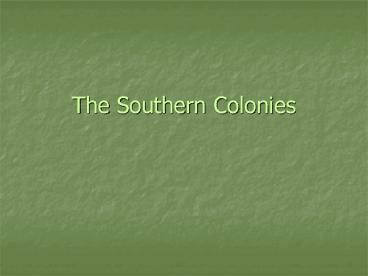The Southern Colonies - PowerPoint PPT Presentation
1 / 15
Title:
The Southern Colonies
Description:
The Southern Colonies Early Life in the Chesapeake Disease: Malaria, dysentery, typhoid born did not survive to their 20s Population grew slowly, only due to ... – PowerPoint PPT presentation
Number of Views:86
Avg rating:3.0/5.0
Title: The Southern Colonies
1
The Southern Colonies
2
Early Life in the Chesapeake
- Disease Malaria, dysentery, typhoid
- ½ born did not survive to their 20s
- Population grew slowly, only due to immigration
- Immigrants were single men in late teens, early
20s - Men out numbered women 6 to 1
- Many outside of wedlock pregnancies
- Few families
- Death separated those that existed
- Children often died
3
Southern Way of Life
- Plantation Owners
- Biggest controllers of the economy, politics, and
society, although small farmers biggest
population - Balls, banquets, parties
- High standard of living
4
Social Hierarchy
- Plantation Owners
- Small Farmers
- Landless whites
- Women
- Indentured Servants
- Slaves
5
Women
- No right to vote or preach
- Some women allowed to own property due to high
death tolls of husbands.
6
The Economy
- Plantation Economy ? Each grew cash crop
- Maryland, VA, NC tobacco
- SC, Georgia rice and indigo
- No towns, b/c no need for markets
- Plantations near rivers so crops could be shipped
to New England or Europe. - Needed more labor
7
Indentured Servants
- Lower than women on social ladder
- No rights while a servant
- Many would die during servitude
- After serving, forced to poor life in western
part of the colonies
8
Headright System
- Employed by VA and MD
- Encourage importation of servant workers
- Masters would receive 50 acres for paying the
passage for coming to the New World
9
Bacons Rebellion
- Freed servants increasingly frustrated
- No Women
- No Land
- Forced into backcountry
- Problems with Natives
- In 1676, a rebellion led by 29 yr old Nathaniel
Bacon against Governor Berkeley and all local
Natives - Many died of disease during the rebellion,
Berkeley able to crush the uprising, hung 20
rebels - Rebellion Crushed, Tensions remained between
wealthy and poor
10
The Slave Trade
11
Slavery
- Grew tremendously after 1680
- Lucky to survive the voyage to the colonies
- 80-90 worked in fields
- The others worked in the house cooking, cleaning,
and raising the masters children - Punishments whippings, beatings
- Full time work for life beginning at age 12 until
death - Acceptable to murder slaves during punishments
12
He (the slave) is called up in the morning at
daybreak, and is seldom allowed time enough to
swallow three mouthfuls of hominy, or hoecake,
but is driven out immediately to the field to
hard labor, at which he continues, without
intermission until noon About noon is the time
he eats his dinner, and he is seldom allowed an
hour for that purposeThey then return to severe
labor, which continues in the field until dusk in
the evening. John Ferdinand Smyth
13
Culture of Slaves
- Basket weaving, pottery, musical traditions, oral
stories, and dances - Created new families when real ones were torn
apart
14
Rebellion of Slaves
- Passive Rebellion Slow Downs, faking illness,
breaking tools - Aggressive Rebellion The Stono Rebellion
- 1739, 20 slaves gathered outside of Charleston
- Killed several white planter families
- White militia later surrounded the group those
not killed in fighting were executed. - Result Harsher slave laws ? Black Codes
15
(No Transcript)































